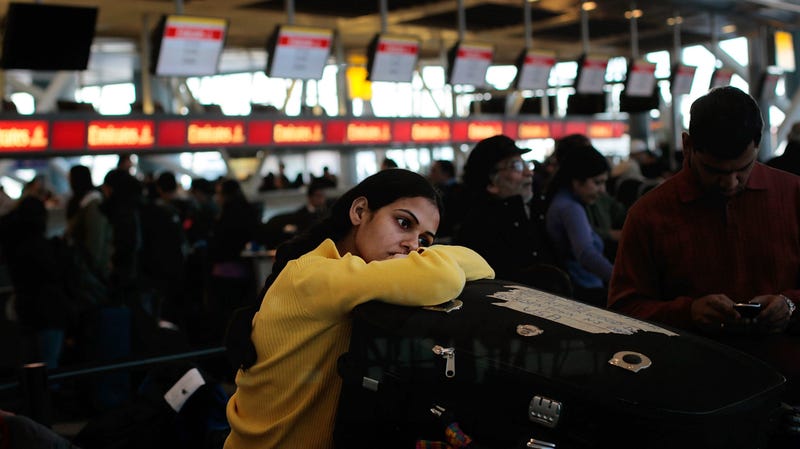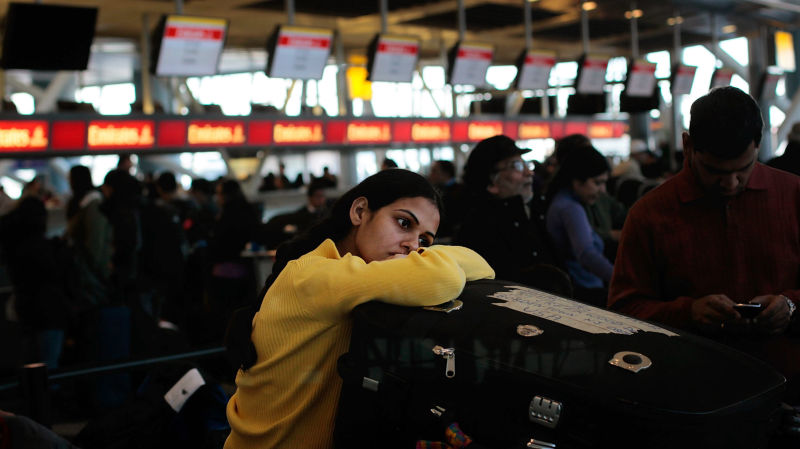
Remember the days when you could board a flight without long security lines and exorbitant bag fees? Believe it or not, there was a time when airports didn’t feel like a nightmare you couldn’t wake up from.
And while security lines may be unavoidable (for now), there are a few ways you can manage to escape those additional fees airlines charge us for overweight bags, extra bags, or, well, having a bag at all.
Advertisement
This week, the Points Guy tackled the question we’ve all been wondering: Do I really have to pay this fee for my bag?
As it turns out, that answer is not necessarily, although often not paying requires that you have the right credit card or a premium ticket. Here is every situation in which you might be able to save on those baggage fees, as TPG writes, in addition to some tried-and-tested advice we’ve pulled together so you’ll never be forced to fork out an extra $35 again.
Advertisement
Take a look at your credit card’s benefits
Have one of those co-branded airline credit cards? You’re in luck: Many of them will protect cardholders from unnecessary bag fees. If you’re flying United, for instance, those with a Chase United Explorer Credit Card are granted a free checked bag on that airline (and the same privilege for one companion).
And if you don’t have one of those co-branded cards, you’re not out of luck just yet. You can also apply for a number of credit cards with huge travel benefits like Chase Sapphire Reserve and Platinum Card from American Express which offer member transferable points you can use as reimbursement for incidental travel costs (Chase Sapphire grants you $300 to cover any costs associated with travel purchases. AMEX’s Platinum Card grants you $200 but restricts you to a single airline).
Advertisement

Check the bag at the gate
You should know this is a gamble, as USA Today writes. But if you’re willing to risk it, you could always check the bag at the gate. You’ll have to bring the bag through security and wait at the gate for an airline attendant looking for volunteers to check their luggage. This usually happens when a flight is very full or the plane is especially small.
Advertisement
It doesn’t hurt to walk straight up to the podium once you’re at the gate and ask an attendant if you can gate-check your bag either, as we’ve previously written. You’re likely to get a positive result, but this isn’t something you’ll see written on any airline website as standard protocol.
You’ll have to have a TSA-ready bag with appropriately sized liquids, but at least you might save a little cash.
Advertisement
Choose the right airline
When choosing a flight, always take into account incidentals (you can use Google Flights to tack on extra costs like bag fees into your overall flight cost). That said, some airlines simply don’t charge you for checked bags, though that’s becoming less and less common. Which airlines exactly? Here are a few airlines offering the best-checked bag policies:
- Southwest allows up to two checked bags for free.
- Air Nippon Airways allows up to checked bags for free.
- British Airways allows one checked bag for free.
- Lufthansa allows one checked bag for free.
- Virgin Atlantic allows one checked bag for free (unless you’re flying “Economy Light” which is a notch below its “Economy Classic” class)
Advertisement
If you couldn’t tell, flying domestically isn’t super favorable to free checked bags (except for Southwest).
Take advantage of your friends and family
If you’re traveling in a group and have a lot of bags to check, make use of anyone in your group who isn’t checking a bag. Why? Let’s take a look at the numbers.
Advertisement
Let’s say you have two bags you need to check. If you’re flying a domestic flight via American, Alaska or United Airlines, the initial bag costs $30 and the second costs $40. If you have a friend who isn’t checking a bag, you’ll benefit from having them check it in on your behalf. Or let’s say you’ve brought a third bag—that’ll typically set you back a whopping $150, in which case, asking a friend to check a bag for you makes a major difference.
If you have a friend flying with an upgraded seat or an elite status on an airline, you also stand to benefit from having them check your bag—they’ll often have the ability to check bags for free. You could upgrade yourself, as well—but if you’re here to save money, that probably isn’t advice you need.
For more from Lifehacker, be sure to follow us on Instagram @lifehackerdotcom.
Advertisement















